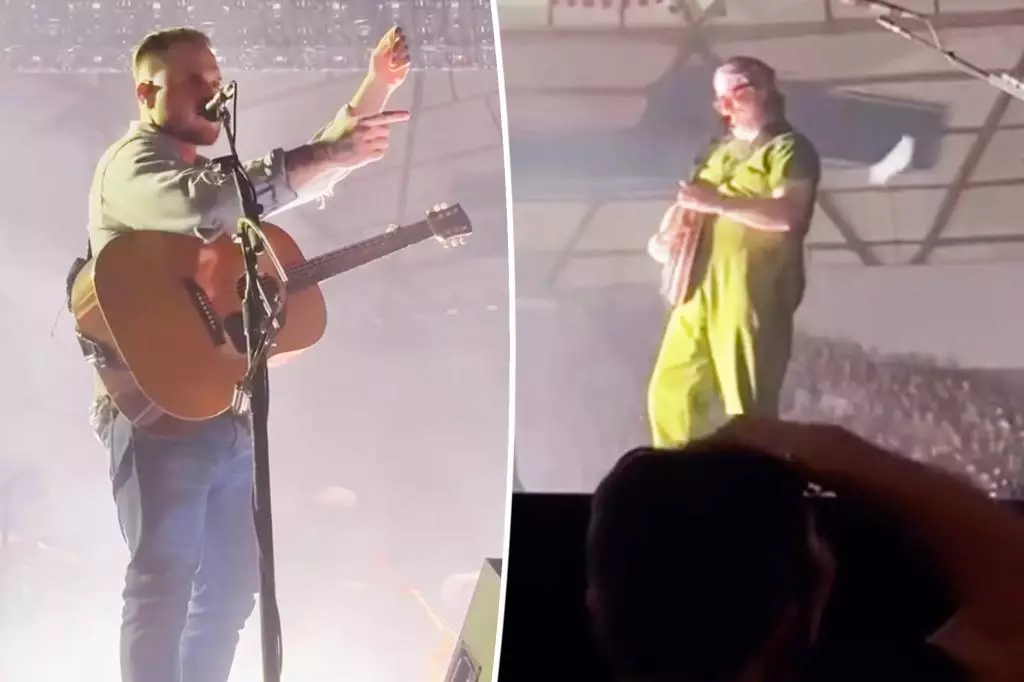At a recent concert in Tacoma, Washington, country music artist Zach Bryan faced an unexpected disruption when an object was thrown onto the stage, hitting his guitarist. This incident not only captured the attention of those in attendance but also raised discussions about the behavior of concertgoers and the ever-shifting dynamics between artists and their audiences. In an increasingly chaotic concert landscape, Bryan’s reaction—expressing frustration and a stern warning to fans—brings to light the growing challenges performers encounter.
Following the incident, which was recorded and shared widely on social media, Bryan took a strong stand against the thoughtless act. Initially, he sought to understand who was responsible by questioning the crowd. “Who threw this? Does anyone know?” he demanded, before reinforcing the point with an emphatic, “Don’t throw s— at concerts!” This not only reflects Bryan’s commitment to maintaining a safe environment for both himself and his band, but also underscores the gravity of the situation in terms of concert safety protocols.
Understanding the Psychology of Concert Behavior
Bryan’s frustration is not an isolated incident. The phenomenon of fans throwing objects on stage has noticeably escalated at concerts across various genres. From rappers to pop stars, numerous artists have faced similar disrespectful behavior. This trend begs the question: what drives fans to act out in such a way? Is it an impulsive act of excitement, a misguided attempt to gain attention, or something more deeply rooted in a lack of respect for the performance and the performer?
The rise of social media has fostered an environment where fans often feel an exaggerated sense of connection to artists, which can sometimes translate into over-familiarity or disrespect. Some concertgoers may believe they are enhancing the experience by participating in a wild and erratic manner, not realizing that they may, in fact, be jeopardizing the safety of performers and fellow fans. Incidents like Bryan’s serve as a reminder that while concerts are places of joy and celebration, they also require a certain code of conduct to ensure everyone’s safety and enjoyment.
Adding to the complexity of the situation is the personal life of an artist, which can greatly influence their performance. On the heels of his separation from Brianna “Chickenfry” LaPaglia, Bryan had shared the strains of that relationship with his audience. LaPaglia has publicly claimed that she experienced emotional abuse during their time together, creating narratives that many fans may find hard to separate from his current performances.
Such revelations can lead to heightened emotions at concerts, as audiences are often acutely aware of the artist’s personal struggles. Bryan’s vulnerability may lead fans to feel a connection with him, but it also opens the door for more intense reactions—both positive and negative—during live performances.
The issue stemming from incidents like Bryan’s is not just about one artist’s response but highlights a larger societal problem regarding public events. Artists like Pink, Drake, and Bebe Rexha have also faced reckless behavior from fans, suggesting that this trend is not limited to one genre or artist. As incidents become more frequent, the need for heightened safety measures at concerts grows.
Maintaining a safe environment for both performers and audience members is crucial. Concert venues must engage in comprehensive planning and implement effective crowd control measures. This includes establishing clear policies regarding what objects are allowed in, enforcing those rules, and ensuring that security teams are vigilant and responsive to any potential threats.
In the end, as artists like Zach Bryan continue to push boundaries with their music while facing escalating challenges in concert settings, a collaborative effort between artists, venues, and fans is essential for cultivating a safe and enjoyable experience. Concertgoers must reassess their behavior, recognizing that respect and safety are paramount to preserving the magic of live performances.

